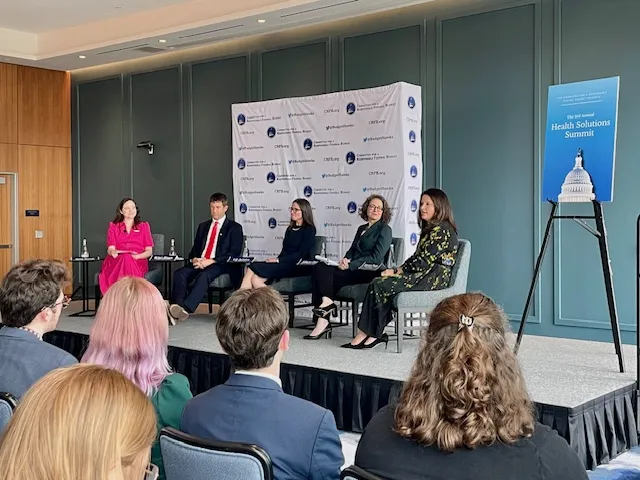Event Recap: Third Annual Health Solutions Summit
On April 3rd, the Committee for a Responsible Federal Budget hosted its Third Annual Health Solutions Summit at the Royal Sonesta, Capitol Hill. The Summit gathers experts in the health policy space to discuss the biggest issues in health care and the federal budget. This year focused on timely issues in Medicare and Medicaid.
The event opened with remarks from Marc Goldwein, the Committee’s Senior Vice President and Senior Policy Director. Goldwein reminded the 240 participants who joined the event about the major health policy moments of the last year, the beginning of drug price negotiations, the new Department of Government Efficiency (DOGE), and the House Budget Resolution that may make changes to Medicare, Medicaid, and the Affordable Care Act (ACA).
The first panel on “Improving Medicare’s Sustainability” was moderated by Josh Gordon of Arnold Ventures and featured James Capretta of the American Enterprise Institute, Leslie Gordon of the Government Accountability Office (GAO), and Lawson Mansell of the Niskanen Center.

From Left to Right: Josh Gordon, James Capretta, Leslie Gordon, & Lawson Mansell.
In response to Josh Gordon’s lead-off question, Leslie Gordon opened by discussing the overall fiscal health of the federal government and Medicare specifically. She noted that Medicare has been on GAO’s high-risk list since the list’s inception in 1990, largely because of its unsustainable fiscal outlook. Capretta followed up by discussing how important the trust fund is to the federal government as a signal of what is not working, then opined on the fact that Part B—which funds outpatient services—will always be solvent but is a rising portion of Medicare costs. Finally, Mansell questioned the country’s ability to afford the Medicare program, especially given that American health outcomes continue to rank lowest amongst other wealthy nations.
When asked what should be on or off the table for lawmakers making difficult fiscal decisions, all panelists agreed that Medicare site-neutral payment policy should be on the table, as it benefits taxpayers, beneficiaries, and would likely have spillover effects that benefit the commercial market. Importantly, Leslie Gordon highlighted that in recent conversations about waste, fraud, and abuse, fraud should be distinguished because it constitutes illegal behavior. Finally, the panel discussed Medicare Advantage (MA) reform and the Committee’s most recent estimate of MA overpayments of $1.2 trillion over a decade. Capretta suggested MA plans should not be determining their own risk adjustment factors, and that improved price transparency would drive down costs, but he cautioned that dramatic changes to the MA program could be detrimental for beneficiaries.
The second panel, “The 119th Congress and the Future of Health Policy,” was moderated by Anna Bonelli of the Committee for a Responsible Federal Budget, and featured speakers Brain Blase of the Paragon Health Institute, Liz Jurinka of the Vistria Group, Allison Orris of the Center on Budget and Policy Priorities, and Monica Popp of Marshall & Popp.

From Left to Right: Anna Bonelli, Brian Blase, Liz Jurinka, Allison Orris, & Monica Popp.
The panel began by level-setting what is on the top of everyone’s minds in Washington: budget reconciliation. Jurinka gave a high-level overview, discussing how the reconciliation process has evolved over time. Popp elaborated by pointing out that Congress is in the beginning phases of the process and that Congress is currently working on numbers, not concrete policy ideas. Bonelli reminded the audience that the current instructions to the House Energy and Commerce Committee suggest that Medicaid will be the subject of reductions, given that many members have stated that reductions to Medicare are off the table.
Throughout the discussion, panelists explained reforms to the Medicaid program to reduce spending while emphasizing the program’s financial outlook and protecting those who rely on services funded by Medicaid. The panel turned to Blase to discuss some of Congress’s options to achieve Medicaid savings, such as provider tax schemes and states’ use of supplemental payments. In the discussion that followed, everyone agreed that the provider tax schemes many states utilize to increase federal funds are permitted under the law, but that Congress should consider reforms to reduce gaming. Finally, Orris discussed how it is important to recognize that reductions in overall Medicaid spending can affect real people enrolled in the program through reductions in eligibility or important benefits.
Our program concluded with a networking reception that hosted Congressional staff, academics, media, health care experts, and policymakers. The Committee thanks our distinguished speakers and all who attended the event.


